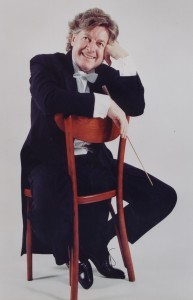
Honors Orchestra a reminder about the urgency of music
This week and next, conductor James Judd will be auditioning musicians for his Miami Music Project Honors Orchestra, part of an effort he considers vital to the future of classical music.
This coming Saturday, and on Feb. 20, the orchestra will be auditioning young players ages 13-21 for a concert March 26 at the Knight Concert Hall as part of the Adrienne Arsht Center Family Fest. Selected musicians perform in the group along with a handful of professionals. Last year’s concert was well-received, and no doubt this year’s will be as well.
The project provides a good way to build future musicians and audiences, because talent knows no neighborhood, and can rise up anywhere. In 2009-10, the project had “adopted” 10 Miami-Dade public schools, and for 2010-11, the list on its website boasts 20 schools.
In reading about the auditions, I was reminded of the talk I had with Judd in late 2009, in which the former Florida Philharmonic director talked eloquently about this project and the importance of music education. I find what he had to say then just as relevant today, especially given the proposal this week from Gov. Rick Scott for a 10 percent cut in public school funding.
One of the most important points he made was what he said about the political urgency of writers such as Beethoven, who was not trying to write pleasant background music: he was trying to say something urgent about current events, and about the human condition generally.
“More and more, I feel, we’ve got to get back to what was the cutting-edge reality of this music,” he told me then. “And it might be that it poses difficult questions for us. And you can’t isolate music, or music education, from other things in our society.
“And if we want a proper society, we have to realize culture can be, in a way, dangerous to politicians,” he said. “It teaches people to ask questions. And I’ve been very afraid that there is a large part of our community, that despite the great teaching available, the resources for the public schools have been cut, cut, cut, cut, cut.”
There are any number of positions one can take on the question of public school funding, and it comes down for some to a question of waste versus want. And to fill in the gaps for those programs that fall on the business side of the budget knife, public schools always have depended on the initiative of well-meaning private citizens, be it in booster clubs for sports teams or groups of parents that pay for buses to take kids to museums, aquariums, concert halls and opera houses.
Judd and his partners in the Miami Music Project felt “we’ve got to give back something; we’ve got to really do something for the arts,” he said. A key focus of that was to nurture new audiences.
“There’s something missing everywhere, and that is everybody’s searching for the new generation of concertgoers,” he said then. “Everybody’s searching to redefine, a little bit, orchestral life.”
And if all younger people know about orchestral music is “subscription concerts, more or less,” it’s harder to develop audiences that will maintain an interest in this music, he said. Thus the Miami Music Project, and it’s encouraging to see that it’s growing and moving ahead.
After all, as Judd told me then, music is something humans were born to make.
“Music is around us all the time. It’s just a natural human state,” he said. “We were probably making music, making vocal noises and singing, and had rhythms, before we had language. It just can’t be denied.”
Recent Content
-
Artsarticle ·
-
Artsarticle ·
-
Artsarticle ·

